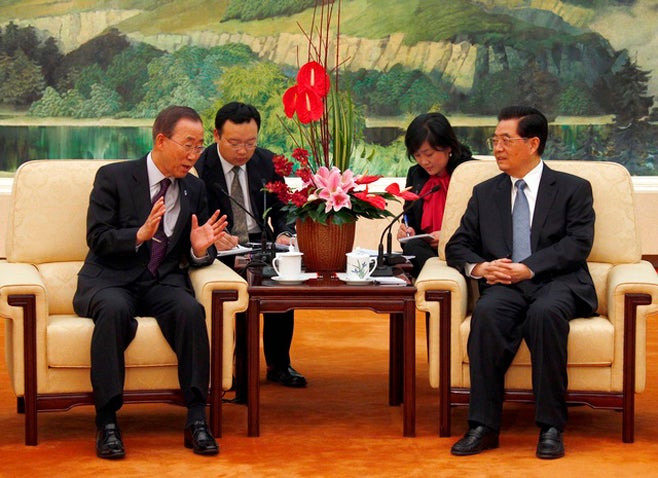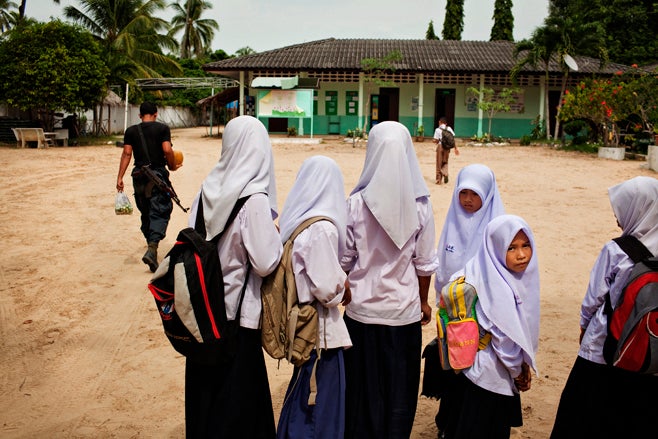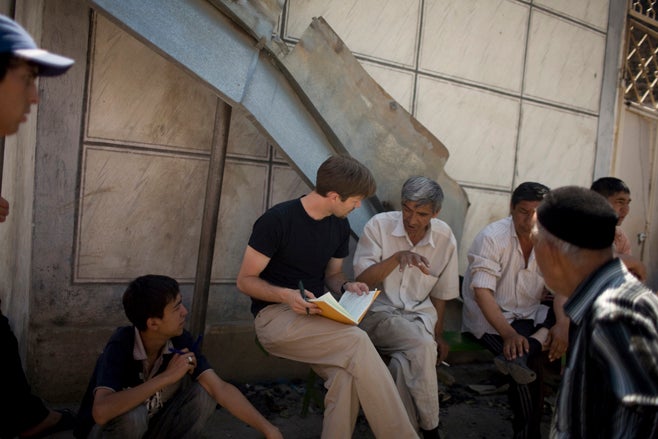Algeria continued to experience widespread human rights violations in 2010. A state of emergency-imposed in 1992 and renewed indefinitely by decree in 1993-created a backdrop for widespread restrictions on freedom of expression, association, and assembly. Authorities justify the measure as necessary to combat terrorism.
Members of the security forces and armed groups continued to enjoy broad impunity for atrocities committed during the violent internal conflict of the 1990s. The state offered compensation to families of persons forcibly disappeared in the 1990s, but failed to provide answers about their fate. Militant groups continued their deadly attacks, mostly targeting security forces, albeit on a lesser scale than in previous years.
Freedom of Expression and Assembly
The state controls broadcast media, which provides live telecasts of parliamentary sessions but airs almost no critical coverage of government policies. Privately-owned newspapers enjoy freer scope, but repressive press laws and dependence on revenues from public sector advertising limit their freedom to criticize the government and the military.
Prosecutors constantly prosecute journalists and independent publications for defaming or insulting public officials. Courts of first instance sometimes sentence them to prison and heavy fines, which appeals courts often overturn or suspend.
Rabah Lemouchi, correspondent for the national Arabic daily Ennahar in Tebessa, is among the journalists who have been jailed in recent years. While most have remained provisionally free pending trial, Lemouchi was incarcerated from his arrest until finishing his sentence six months later. A court of first instance convicted him on July 14, 2009, of defamation and insulting state institutions, mainly due to a personal letter he had addressed in 2006 to President Abdel Aziz Bouteflika. Details of the case indicate that his prosecution and imprisonment were politically motivated.
In the first half of 2010 at least two journalists received prison terms for defamation but remained free pending appeal. On May 13 a court in the city of Mostaganem sentenced Belkacem Belhamideche, director of the French-language Reflexion and one of the daily's reporters, to six months in prison for coverage of a letter that a businessman wrote accusing a town mayor of soliciting a bribe from him. A court in the town of Ain Boucif, in the governorate of Medea, sentenced Saleh Souadi of el-Khabar, Algeria's leading independent Arabic-language daily, to six months in jail for defaming a local hospital director, even though his articles appeared before the director assumed his post and did not name him.
A 2000 decree banning demonstrations in Algiers remained in effect in 2010. Despite the ban, SOS Disparu(e)s- an organization comprised of relatives of persons forcibly disappeared-has held small vigils in front of the Algiers headquarters of the state human rights commission for most Wednesdays since 1998, in spite of occasional police harassment. In August police dispersed the gathering and briefly arrested the protesters, who were demanding the state provide information regarding the fate of persons whom state security forces abducted in the 1990s and were never seen again.
Authorities require organizations to obtain authorization from the local governor before holding indoor public meetings, and frequently ban meetings organized by human rights organizations or rights organizations working on behalf of Algeria's Kabyle population. Authorities refused to allow the Algerian League for the Defense of Human Rights (LADDH) to hold its national congress on March 25-26 at a public venue in an Algiers suburb. The governorate of Algiers announced the refusal on the eve of the congress, even though the LADDH had formally requested permission a month earlier. The LADDH moved its congress to the Maison des syndicats in Bachdjarrah, a privately owned venue; two months later, the authorities closed that hall, one of the few in the capital where controversial civil society organizations had been able to meet.
On July 23, police in the city of Tizi-Ouzou broke up a human rights seminar organized by the World Amazigh Congress in collaboration with two local Amazigh (Berber) organizations. Police entered the meeting hall, confiscated materials, questioned attendees, and expelled two French participants from the country. Authorities did not explain their action.
Authorities frequently deny journalists and human rights workers entry visas. On October 2, 2010, the Algerian embassy in Washington refused visas for Human Rights Watch to conduct general research, explaining they could visit only the Polisario-run refugee camps near Tindouf. The authorities told Amnesty International the same thing in 2010. Authorities expelled two journalists with the Moroccan weekly Assahrae al-Ousbouiya on September 22.
Freedom of Religion
Algeria's constitution defines the state religion as Islam and requires the president to be a Muslim. Algerian laws criminalize non-Muslims proselytizing to Muslims but not the reverse, and forbid non-Muslims from gathering to worship except in state-approved locations. In practice, authorities rarely authorize Algerian Protestant groups to use buildings for worship, subjecting worshippers to possible prosecution. A court in al-Arba Nath Irathen, Tizi-Ouzou province, tried Mahmoud Yahou and three other Christians for "practicing religious rites without authorization." The trial is continuing at this writing. An appeals court in Jijel on June 22 convicted another Christian, Abdelhamid Bouamama, from Grarem in Mila province, of trying to convert Muslims and sentenced him to one year in prison, suspended.
Impunity for Past Abuses
Over 100,000 Algerians died during the political strife of the 1990s. Thousands more were "disappeared" by security forces or abducted by armed groups fighting the government and never found. The 2006 Law on Peace and National Reconciliation provides a legal framework for the continued impunity enjoyed by perpetrators of atrocities during the this era. The law provides amnesty to security force members for actions they took in the name of combating terrorism and to armed group members not implicated in the most heinous acts.
The law promises compensation for families of "disappeared" persons, but simultaneously makes it a crime to denigrate state institutions or security forces for the manner in which they conducted themselves during the political strife. Organizations representing the families of the "disappeared" have criticized the state's failure to provide a detailed account of the fate of their missing relatives.
In one case dating to the civil strife of the 1990s, Malik Mejnoun and Abdelkader Chenoui have been in pre-trial detention since 1999 in connection with the assassination one year earlier of Kabyle singer-activist Lounes Matoub. Both men claim they are innocent and say they were tortured while in detention without access to communications. Eleven years later they have yet to be brought to trial.
Algeria amended its penal code in 2004 to make torture an explicit crime. The International Committee of the Red Cross regularly visits ordinary prisons in Algeria, but not places of detention run by the powerful Department for Information and Security (DRS), an intelligence agency within the military.
Algerian courts pronounced death sentences during 2010, some of them against defendants in terrorism cases and most in absentia. Algeria has observed a de facto moratorium on executions since 1993.
Terrorism and Counterterrorism
Militant attacks were down dramatically compared to the mid-1990s, but al Qaeda in the Islamic Maghreb (AQIM) continued to launch fatal attacks, directed mostly-but not exclusively-at military and police targets. On June 25, gunmen-whom Algerian media linked to terrorists-fired on a wedding party in the eastern wilaya (province) of Tebessa, killing the bridegroom, a young soldier, and four guests.
In July the United States for the first time sent home an Algerian who had been held at Guantanamo and opposed his repatriation, fearing persecution. The US government said Algeria had given "diplomatic assurances" that Abdul Aziz Naji would be treated humanely. Shortly after arriving, Naji, like other Algerian returnees from Guantanamo before him, appeared before an investigative judge to answer accusations of membership in a terrorist group abroad and was released pending trial, which is continuing at this writing. On November 4 an Algiers court acquitted an earlier Guantanamo returnee, Sofiane Hadarbache, of similar charges. Eight Algerian detainees remain in Guantanamo at this writing, of whom at least five reportedly oppose their return.
Key International Actors
Algeria in 2010 did not extend invitations to five special procedures of the United Nations Human Rights Council that had requested them, including the Working Group on Enforced and Involuntary Disappearances and the special rapporteurs on torture and on human rights while countering terrorism. Algeria announced invitations to visit during 2011 to seven other special rapporteurs, including those on violence against women and on the right to freedom of opinion and expression.
Algeria and the European Union have an association agreement in effect since 2005. In June they signed an agreement that provides Algeria €172 million (approximately US$234 million) in aid during 2011-2013. In 2009 the two sides agreed to create a subcommittee of the Association Council on "Political Dialogue, Security and Human Rights."
According to the US government, Algeria "is a major partner in combating extremism and terrorist networks such as Al Qa'ida and is our second-largest trading partner in the Arab world." The US provides almost no financial aid to Algeria, but is the leading customer of its exports, primarily gas and oil. Other than the annual Country Reports on Human Rights Practices, the US said almost nothing publicly on Algeria's human rights record. In a visit to Algeria in October, Department of State Special Advisor Judith E. Heumann praised the government for ratifying the UN Convention of the Rights of Persons with Disabilities in December 2009.



